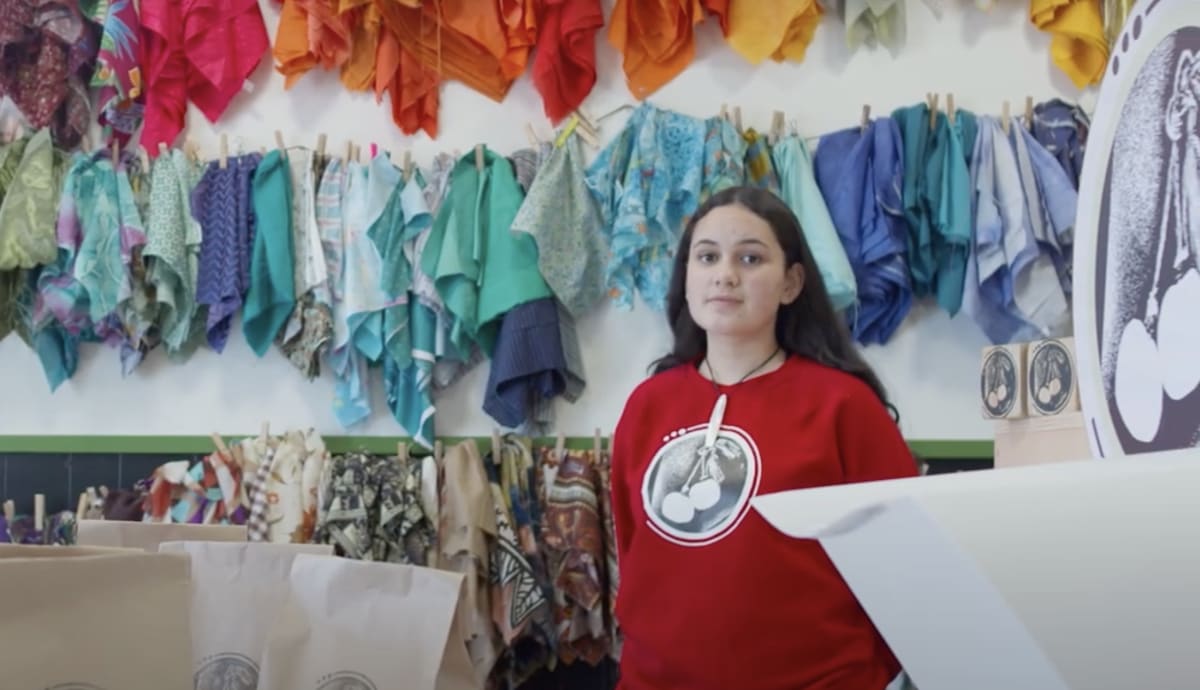
Georgia Latu started making Māori poi as a fundraiser when she was 12. Four years later she has her own business, 30 workers paid the living wage, and a supply contract for the Rugby World Cup
When Dunedin-based high school student Georgia Latu looks around Eden Park during the Women’s Rugby World Cup final she’ll see thousands of people twirling poi.
Many of them her poi.
Wā Poi (it’s poi time) has become a big feature of the games at the NZ-based event. And Latu, whose company Pōtiki Poi is now the biggest poi manufacturer in the world, has supplied close to 30,000 of the Māori taonga, including 5000 for the final.

“We were contacted by the Rugby World Cup and they said ‘Could we supply 2000 poi’, and we said ‘We can do it in two weeks’, and they were taken aback and upped the order to 10,000 for the first game, then 22,000, then 27,000.”
Georgia (Kai Tahu, Ngāpuhi) doesn’t say how much the order was worth - mum Anna Latu, a senior lecturer in Māori health and cultural competance at Otago University, deals with most of the financial side of the business, she says.
But the price of a pair of poi on the Pōtiki Poi site ranges from $22 to $40.

How did they feel when they got the Women's Rugby World Cup order?
“Mum and I were very emotional,” Georgina Latu says. “It’s the first time something like this happened - normalising and uplifting our Māori taonga - and we were part of that.”
(Read LockerRoom editor Suzanne McFadden's story on how how a small round ball became a highlight of the RWC tournament.)
Then all they had to do was work out how they were going to make that many poi – in the middle of a labour shortage.
He mahi pai noa iho.
“We sent out a tono to get people keen to work and earn living wage and we were overwhelmed with support, people wanting to help grow our kaupapa. People from church, from school, everyone. It was amazing to give first-time employment for friends.”
Pōtiki Poi is in its fourth premises in three years, after outgrowing the family lounge and its first two workspaces. The company pays the living wage to its 30-odd staff, employs a diverse workforce, and uses upcycled material scraps from op-shops and elsewhere for the upoko or head of the poi.

Sustainability is part of the kaupapa, Georgia says. When she and her whanau first made poi, they didn’t use plastic. Now her uncle, a textiles expert, has found a biodegradable plastic that breaks down in four years.
"We went to 48-hour bootcamp for start-ups and won the people’s choice award and thought, ‘This is much bigger.’" Georgia Latu
The company also makes money.
“People said we wouldn't make a profit for the first three years but we have made a profit every year.”
History of an entrepreneur
The idea for Pōtiki Poi came when Georgia was 12 and wanted to go on a trip from home in Ōtepoti (Dunedin) to the North Island. She turned her talent for making things into a poi fundraiser and soon had $1000.
“My auntie said, ‘We’re having a 48-hour boot camp for start-up businesses, so why don’t you guys come?’
“And at that time, we thought this was just a hobby, just a fundraiser. But we went there and won the people’s choice award and thought, ‘This is much bigger’.”
Over the last few weeks, Georgia has won other awards. Prestigious ones. In October she was named Young Māori Business Leader at the Aotearoa Māori Business Leaders Awards, run by the Auckland University Business School. Then last week she won the Blake Leader Award for Rangatahi.

A group of whanau came with her to Auckland for the awards and stayed for the world cup final.
They will be looking out for her poi in the crowd - to the amateur, World Cup poi all look the same, but she knows hers because they are the ones with the traditional twisted taura (cord), as opposed to a braided one.
And the future? Georgia is finishing NCEA Level 2 this year and wants to do University Entrance. Earlier in the year, she and Anna published a book, Ngā Mihi, about the whakapapa of poi, and Pōtiki Poi has just opened a Kura Poi dance academy - teaching rangatahi and adults the art of poi.
Pōtiki pois are selling in about 40 Countdown stores, and Georgia hopes the dance classes will get picked up overseas - she’s already had an enquiry from Japan sparked by the Rugby World Cup coverage.
And while she says her ultimate goal is to be a ta moko artist, she wants Põtiki Poi to keep running; she hopes her little brother Api, born with Down’s Syndrome, might one day be part of its diverse workforce.
People ask me ‘How do I keep a balanced life?' I don’t have a balanced life - I’m super busy. It’s crazy we’ve come so far.”







